6 books about Hejinian, Lyn
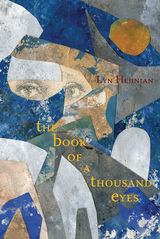
The Book of a Thousand Eyes
Lyn Hejinian
Omnidawn, 2012
Written over the course of two decades, The Book of a Thousand Eyes was begun as an homage to Scheherazade, the heroine of The Arabian Nights who, through her nightly tale-telling, saved her culture and her own life by teaching a powerful and murderous ruler to abandon cruelty in favor of wisdom and benevolence. Hejinian’s book is a compendium of “night works”—lullabies, bedtime stories, insomniac lyrics, nonsensical mumblings, fairy tales, attempts to understand at day’s end some of the day’s events, dream narratives, erotic or occasionally bawdy ditties, etc. The poems explore and play with languages of diverse stages of consciousness and realms of imagination. Though they may not be redemptive in effect, the diverse works that comprise The Book of a Thousand Eyes argue for the possibilities of a merry, pained, celebratory, mournful, stubborn commitment to life.
[more]
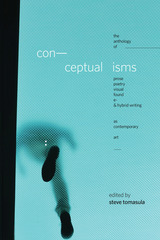
Conceptualisms
The Anthology of Prose, Poetry, Visual, Found, E- & Hybrid Writing as Contemporary Art
Edited by Steve Tomasula
University of Alabama Press, 2022
A wide-ranging anthology of experimental writing—prose, poetry, and hybrid—from its most significant practitioners and innovators
A variety of names have been used to describe fiction, poetry, and hybrid writing that explore new forms and challenges mainstream traditions. Those phrases include experimental, conceptual, avant-garde, hybrid, surfiction, fusion, radical, slip-stream, avant-pop, postmodern, self-conscious, innovative, L=A=N=G=U=A=G=E writing, alternative, and anti- or new literature. Conceptualisms: The Anthology of Prose, Poetry, Visual, Found, E- & Hybrid Writing as Contemporary Art is the first major anthology of writing that offers readers an overview of this other tradition as it lives in the early decades of the 21st century.
Featuring over 100 pieces from more than 90 authors, this anthology offers a plethora of aesthetics and approaches to a wide variety subjects. Editor Steve Tomasula has gathered poems, prose, and hybrid pieces that all challenge our understanding of what literature means. Intended as a collection of the most exciting and bold literary work being made today, Tomasula has put a spotlight on the many possibilities available to writers and readers wishing for a glimpse of literature’s future.
Readers will recognize authors who have shaped contemporary writing, as among them Lydia Davis, Charles Bernstein, Jonathan Safran Foer, Shelley Jackson, Nathaniel Mackey, David Foster Wallace, and Claudia Rankine. Even seasoned readers will find authors, and responses to the canon, not yet encountered. Conceptualisms is a book of ideas for writers, teachers and scholars, as well as readers who wonder how many ways literature can live.
The text features headnotes to chapters on themes such as sound writing, electronic literature, found text, and other forms, offering accessible introductions for readers new to this work. An online companion presents statements about the work and biographies of the authors in addition to audio, video, and electronic writing that can’t be presented in print. Visit www.conceptualisms.info to read more.
A variety of names have been used to describe fiction, poetry, and hybrid writing that explore new forms and challenges mainstream traditions. Those phrases include experimental, conceptual, avant-garde, hybrid, surfiction, fusion, radical, slip-stream, avant-pop, postmodern, self-conscious, innovative, L=A=N=G=U=A=G=E writing, alternative, and anti- or new literature. Conceptualisms: The Anthology of Prose, Poetry, Visual, Found, E- & Hybrid Writing as Contemporary Art is the first major anthology of writing that offers readers an overview of this other tradition as it lives in the early decades of the 21st century.
Featuring over 100 pieces from more than 90 authors, this anthology offers a plethora of aesthetics and approaches to a wide variety subjects. Editor Steve Tomasula has gathered poems, prose, and hybrid pieces that all challenge our understanding of what literature means. Intended as a collection of the most exciting and bold literary work being made today, Tomasula has put a spotlight on the many possibilities available to writers and readers wishing for a glimpse of literature’s future.
Readers will recognize authors who have shaped contemporary writing, as among them Lydia Davis, Charles Bernstein, Jonathan Safran Foer, Shelley Jackson, Nathaniel Mackey, David Foster Wallace, and Claudia Rankine. Even seasoned readers will find authors, and responses to the canon, not yet encountered. Conceptualisms is a book of ideas for writers, teachers and scholars, as well as readers who wonder how many ways literature can live.
The text features headnotes to chapters on themes such as sound writing, electronic literature, found text, and other forms, offering accessible introductions for readers new to this work. An online companion presents statements about the work and biographies of the authors in addition to audio, video, and electronic writing that can’t be presented in print. Visit www.conceptualisms.info to read more.
[more]
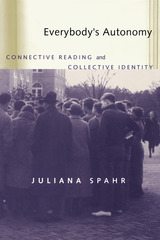
Everybody's Autonomy
Connective Reading and Collective Identity
Juliana Spahr
University of Alabama Press, 2001
Experimental texts empower the reader by encouraging self-governing approaches to reading and by placing the reader on equal footing with the author. Everybody's Autonomy is about reading and identity.
Contemporary avant garde writing has often been overlooked by those who study literature and identity. Such writing has been perceived as unrelated, as disrespectful of subjectivity. But Everybody's Autonomy instead locates within avant garde literature models of identity that are communal, connective, and racially concerned. Everybody's Autonomy, as it tackles literary criticism's central question of what sort of selves do works create, looks at works that encourage connection, works that present and engage with large, public worlds that are in turn shared with readers. With this intent, it aligns the iconoclastic work of Gertrude Stein with foreign, immigrant Englishes and their accompanying subjectivities. It examines the critique of white individualism and privilege in the work of language writers Lyn Hejinian and Bruce Andrews. It looks at how Harryette Mullen mixes language writing's open text with the distinctivesness of African-American culture to propose a communal, yet still racially conscious identity. And it examines Theresa Hak Kyung Cha's use of broken English and French to unsettle readers' fluencies and assimilating comprehensions, to decolonize reading. Such works, the book argues, well represent and expand changing notions of the public, of everybody.
Contemporary avant garde writing has often been overlooked by those who study literature and identity. Such writing has been perceived as unrelated, as disrespectful of subjectivity. But Everybody's Autonomy instead locates within avant garde literature models of identity that are communal, connective, and racially concerned. Everybody's Autonomy, as it tackles literary criticism's central question of what sort of selves do works create, looks at works that encourage connection, works that present and engage with large, public worlds that are in turn shared with readers. With this intent, it aligns the iconoclastic work of Gertrude Stein with foreign, immigrant Englishes and their accompanying subjectivities. It examines the critique of white individualism and privilege in the work of language writers Lyn Hejinian and Bruce Andrews. It looks at how Harryette Mullen mixes language writing's open text with the distinctivesness of African-American culture to propose a communal, yet still racially conscious identity. And it examines Theresa Hak Kyung Cha's use of broken English and French to unsettle readers' fluencies and assimilating comprehensions, to decolonize reading. Such works, the book argues, well represent and expand changing notions of the public, of everybody.
[more]
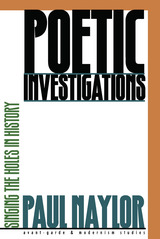
Poetic Investigations
Singing the Holes in History
Paul Naylor
Northwestern University Press, 1999
Poetic Investigations studies five contemporary writers whose radical engagements with poetic form and political content shed new light on issues of race, class, and gender. In a detailed reading of three American poets—Susan Howe, Nathaniel Mackey, and Lyn Hejinian—and two African-Caribbean poets, Kamau Brathwaite and M. Nourbese Philip, Paul Naylor argues that these writers have produced new forms of poetry that address the "holes," or erasures, in history that more traditional poetry neglects.
[more]
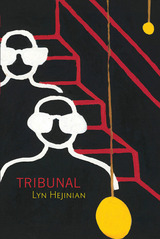
Tribunal
Lyn Hejinian
Omnidawn, 2019
The three works of poetry that constitute Tribunal were written in the current context of seemingly ubiquitous warfare and the specter of unabashed neo-fascism, ethno-nationalism, and—especially in the United States—reassertions of white supremacy. As renowned poet Lyn Hejinian recounts, the inspiration for Tribunal gradually took shape over the course of almost a decade in the collaborative work she has done to fight neoliberal policies that dismantle the public sphere through actions that include privatizing the commons, busting unions, and imposing a corporate, profiteering model on a range of institutions including public higher education. Hejinian explores a broad range of responses to our deeply troubling historical period in Tribunal’s three collections. These poems express an emotional scope that includes fury, sadness, and even, at times, something very close to pity for our humanity, perpetually unable to avoid its own penchant for cruelty. Hejinian is the rare poet who can bring to the page a rich, complex rendering of how mutually exclusive emotions can exist simultaneously. We lose safety and surety, but we gain a wider lens on contemporary crises from her sometimes lacerating, sometimes intensely beautiful lyric verse. It’s only in such an artistic and emotional landscape that readers, thinkers, artists, workers, and all comrades against injustice can manage to keep inventing, imagining, and hoping. Throughout these crises, the poet returns to language as a meaningful space in which to grapple with a seemingly endless cycle of conflict. While the works can be read as expressions of protest or dissent, they powerfully convey an argument for artmaking itself—and a turn to its affirmation of life.
[more]
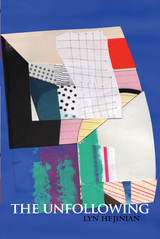
The Unfollowing
Lyn Hejinian
Omnidawn, 2016
The Unfollowing is a sequence of elegies, mourning public as well as personal loss. The grief is not coherent. Though the poems are each fourteen lines long, they are not sonnets but anti-sonnets. They are composed entirely of non sequiturs, with the intention of demonstrating, if not achieving, a refusal to follow aesthetic proprieties, and a rejection of the logic of mortality and of capitalism. Outrage, hilarity, anxiety, and ribaldry are not easily separated in the play of human emotions. And they are all the proper, anarchic medium for staying alive.
[more]
READERS
Browse our collection.
PUBLISHERS
See BiblioVault's publisher services.
STUDENT SERVICES
Files for college accessibility offices.
UChicago Accessibility Resources
home | accessibility | search | about | contact us
BiblioVault ® 2001 - 2024
The University of Chicago Press









